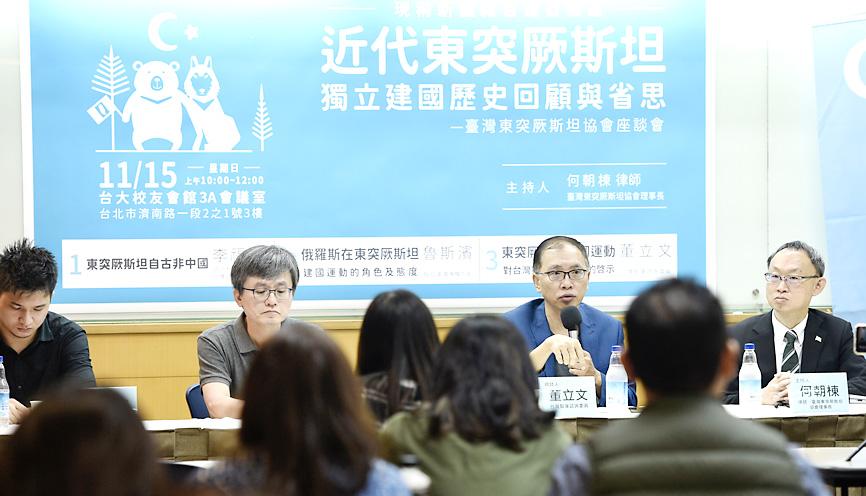There is a rivalry between China’s Belt and Road Initiative (BRI) and Russia’s Central Asia strategy, columnist Lu Ssu-pin (魯斯濱) said in Taipei yesterday, while another expert said the future of the initiative would “determine the fate of Uighurs in Xinjiang.”
Lu made the comment at a panel discussion held by the Taiwan East Turkestan Association and moderated by association president Ho Chao-tung (何朝棟).
Lu, as well as Li Fu-chung (李福鐘), an associate professor at National Chengchi University’s Graduate Institute of Taiwan History, and Taiwan Thinktank advisory committee member Tung Li-wen (董立文), were invited as speakers to discuss the history of East Turkestan, now known as China’s Xinjiang Uighur Autonomous Region.

Photo: George Tsorng, Taipei Times
Russia has complicated feelings about Xinjiang, Lu said.
For Russia, the region is already being effectively controlled by China and as a result, in terms of Russia’s China strategy, Xinjiang is a place that no longer holds much “obvious strategic value,” he said.
This is why strategists in Kazakhstan and Russia have responded to reports of concentration camps in Xinjiang with a relatively cold attitude, Lu said.
“The most direct and obvious strategic confrontation between Russia and China is reflected in Kazakhstan,” he said, adding that the Central Asian country, which is geographically located between Russia and China, is also an indicator of relations between Moscow and Beijing.
Kazakhstan has not been a priority in US foreign policy for many years, Lu said, adding that it is unlikely that the US would become involved in matters there, as it would be slightly difficult for the US to get involved even in Belarus.
China was not that interested in Central Asia before 2013, but it later proposed the Belt and Road Initiative, he said.
Russian President Vladimir Putin’s formation in 2010 of a customs union among Russia, Belarus and Kazakhstan was aimed at curtailing China’s influence, Lu said.
However, due to factors such as plummeting oil prices, the COVID-19 pandemic and the US presidential election, Russia has temporarily paused its Central Asia strategy, he said, adding that Moscow is observing the international situation before it adjusts its strategy.
Few people in Taiwan have studied Xinjiang over the past two decades, while there is ample Mandarin and English-language material on Tibet, Tung said.
While the Belt and Road Initiative wields considerable economic power, it remains to be seen how long that power would last overseas, he said.
When other countries express diplomatic support for China and stand with Beijing not because of shared values, but for interests, they expect to receive benefits in return, Tung said.
He said he does not think China’s economic strategy will last long due to the country’s internal socioeconomic problems and the US-China trade dispute.
The development of the Belt and Road Initiative will “determine the fate of Uighurs in Xinjiang,” he said.

Taiwanese scientists have engineered plants that can capture about 50 percent more carbon dioxide and produce more than twice as many seeds as unmodified plants, a breakthrough they hope could one day help mitigate global warming and grow more food staples such as rice. If applied to major food crops, the new system could cut carbon emissions and raise yields “without additional equipment or labor costs,” Academia Sinica researcher and lead author the study Lu Kuan-jen (呂冠箴) said. Academia Sinica president James Liao (廖俊智) said that as humans emit 9.6 billion tonnes of carbon dioxide compared with the 220 billion tonnes absorbed

The Taipei Mass Rapid Transit (MRT) Wanda-Zhonghe Line is 81.7 percent complete, with public opening targeted for the end of 2027, New Taipei City Mayor Hou You-yi (侯友宜) said today. Surrounding roads are to be open to the public by the end of next year, Hou said during an inspection of construction progress. The 9.5km line, featuring nine underground stations and one depot, is expected to connect Chiang Kai-shek Memorial Hall Station to Chukuang Station in New Taipei City’s Jhonghe District (中和). All 18 tunnels for the line are complete, while the main structures of the stations and depot are mostly finished, he

Taipei is to implement widespread road closures around Taipei 101 on Friday to make way for large crowds during the Double Ten National Day celebration, the Taipei Department of Transportation said. A four-minute fireworks display is to be launched from the skyscraper, along with a performance by 500 drones flying in formation above the nearby Nanshan A21 site, starting at 10pm. Vehicle restrictions would occur in phases, they said. From 5pm to 9pm, inner lanes of Songshou Road between Taipei City Hall and Taipei 101 are to be closed, with only the outer lanes remaining open. Between 9pm and 9:40pm, the section is

China’s plan to deploy a new hypersonic ballistic missile at a Chinese People’s Liberation Army Rocket Force (PLARF) base near Taiwan likely targets US airbases and ships in the western Pacific, but it would also present new threats to Taiwan, defense experts said. The New York Times — citing a US Department of Defense report from last year on China’s military power — on Monday reported in an article titled “The missiles threatening Taiwan” that China has stockpiled 3,500 missiles, 1.5 times more than four years earlier. Although it is unclear how many of those missiles were targeting Taiwan, the newspaper reported